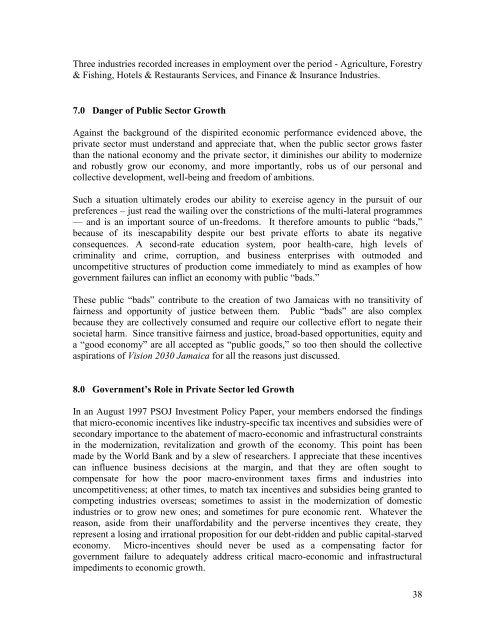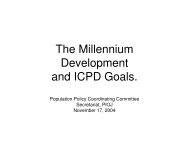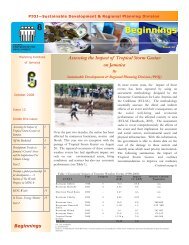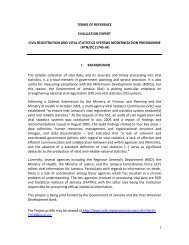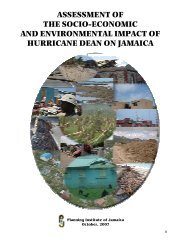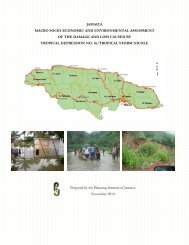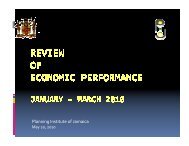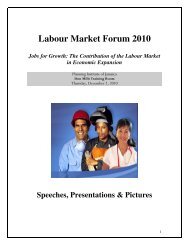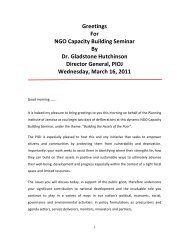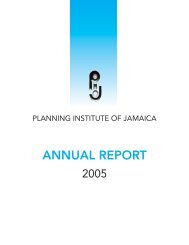PIOJ Growth-Inducement Strategy - Planning Institute of Jamaica
PIOJ Growth-Inducement Strategy - Planning Institute of Jamaica
PIOJ Growth-Inducement Strategy - Planning Institute of Jamaica
You also want an ePaper? Increase the reach of your titles
YUMPU automatically turns print PDFs into web optimized ePapers that Google loves.
Three industries recorded increases in employment over the period - Agriculture, Forestry<br />
& Fishing, Hotels & Restaurants Services, and Finance & Insurance Industries.<br />
7.0 Danger <strong>of</strong> Public Sector <strong>Growth</strong><br />
Against the background <strong>of</strong> the dispirited economic performance evidenced above, the<br />
private sector must understand and appreciate that, when the public sector grows faster<br />
than the national economy and the private sector, it diminishes our ability to modernize<br />
and robustly grow our economy, and more importantly, robs us <strong>of</strong> our personal and<br />
collective development, well-being and freedom <strong>of</strong> ambitions.<br />
Such a situation ultimately erodes our ability to exercise agency in the pursuit <strong>of</strong> our<br />
preferences – just read the wailing over the constrictions <strong>of</strong> the multi-lateral programmes<br />
— and is an important source <strong>of</strong> un-freedoms. It therefore amounts to public “bads,”<br />
because <strong>of</strong> its inescapability despite our best private efforts to abate its negative<br />
consequences. A second-rate education system, poor health-care, high levels <strong>of</strong><br />
criminality and crime, corruption, and business enterprises with outmoded and<br />
uncompetitive structures <strong>of</strong> production come immediately to mind as examples <strong>of</strong> how<br />
government failures can inflict an economy with public “bads.”<br />
These public “bads” contribute to the creation <strong>of</strong> two <strong>Jamaica</strong>s with no transitivity <strong>of</strong><br />
fairness and opportunity <strong>of</strong> justice between them. Public “bads” are also complex<br />
because they are collectively consumed and require our collective effort to negate their<br />
societal harm. Since transitive fairness and justice, broad-based opportunities, equity and<br />
a “good economy” are all accepted as “public goods,” so too then should the collective<br />
aspirations <strong>of</strong> Vision 2030 <strong>Jamaica</strong> for all the reasons just discussed.<br />
8.0 Government’s Role in Private Sector led <strong>Growth</strong><br />
In an August 1997 PSOJ Investment Policy Paper, your members endorsed the findings<br />
that micro-economic incentives like industry-specific tax incentives and subsidies were <strong>of</strong><br />
secondary importance to the abatement <strong>of</strong> macro-economic and infrastructural constraints<br />
in the modernization, revitalization and growth <strong>of</strong> the economy. This point has been<br />
made by the World Bank and by a slew <strong>of</strong> researchers. I appreciate that these incentives<br />
can influence business decisions at the margin, and that they are <strong>of</strong>ten sought to<br />
compensate for how the poor macro-environment taxes firms and industries into<br />
uncompetitiveness; at other times, to match tax incentives and subsidies being granted to<br />
competing industries overseas; sometimes to assist in the modernization <strong>of</strong> domestic<br />
industries or to grow new ones; and sometimes for pure economic rent. Whatever the<br />
reason, aside from their unaffordability and the perverse incentives they create, they<br />
represent a losing and irrational proposition for our debt-ridden and public capital-starved<br />
economy. Micro-incentives should never be used as a compensating factor for<br />
government failure to adequately address critical macro-economic and infrastructural<br />
impediments to economic growth.<br />
38


